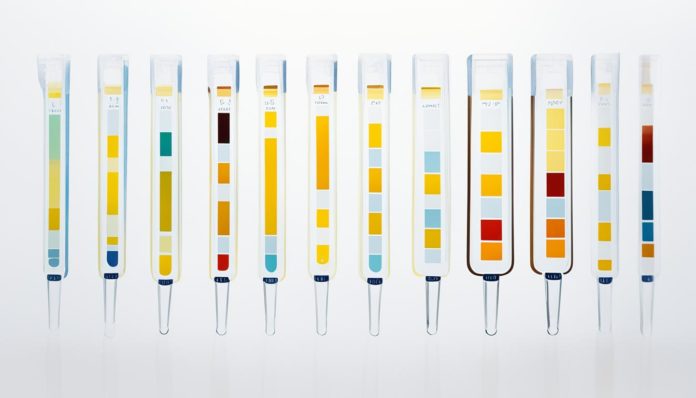About 10% of people in the U.S. have diabetes. Keeping track of your diabetes with urine tests is key. These tests are not as exact as blood tests but are useful for those who can’t do blood tests regularly. Diabetes urine testing tells us about sugar and ketone levels in the body. This helps catch serious issues like Diabetic Ketoacidosis (DKA) early.
Understanding how these tests work is important for managing diabetes well.
Key Takeaways
- Diabetes urine testing is crucial for monitoring glucose and ketone levels.
- Urine tests can help detect serious conditions like Diabetic Ketoacidosis (DKA).
- While less accurate than blood tests, urine glucose tests are necessary for those unable to perform blood tests.
- Diabetic urinalysis provides broader health insights beyond glucose and ketones.
- These tests can be conducted both at home and by healthcare professionals.
Understanding Diabetes and Its Types
Diabetes is a health issue where blood sugar levels are too high because the body can’t use insulin properly. It’s caused by problems with insulin production or use. These issues can come from different body mechanisms involving the pancreas and insulin resistance.
Type 1 Diabetes
Type 1 Diabetes usually starts in childhood and is an autoimmune problem. The body’s immune system attacks insulin-making cells in the pancreas by mistake. So, the body can’t make insulin, causing sugar levels to rise.

Type 2 Diabetes
Type 2 Diabetes mostly begins in adults and develops slowly. It’s often due to insulin resistance, meaning the body’s cells don’t respond well to insulin. To fix this, the pancreas makes more insulin. But eventually, blood sugar goes up, making the metabolic disease worse.
How Urine Tests for Diabetes Work
Urine tests are key for managing diabetes. They give insights into glucose and ketone levels. Diabetes Urine Analysis helps find glucose, showing if blood sugar is not well controlled.

Blood tests are more common because they’re more precise. Yet, urine tests are still useful in some cases. They can spot early signs of issues with a Diabetic Kidney Function Test. They also find albumin with a Urine Microalbumin Test, checking for kidney harm.
For those with Type 1 Diabetes, checking ketones is crucial. It’s important whether done at home or by a doctor. These tests watch for diabetic ketoacidosis (DKA), which high sugar or sickness can cause.
To wrap up, blood tests are usually the go-to for accuracy. But urine tests are great for regular checks and finding early problems. They are essential for comprehensive diabetes care.
Glucose in Urine: What It Means
Finding glucose in urine, known as glycosuria, usually means blood sugar is too high. This could point to diabetes or other serious health problems. It’s important to check urine glucose regularly to catch issues early.
Causes of Glucose in Urine
Glucose in urine can happen for several reasons:
- Diabetes Mellitus: A common reason, where the body can’t handle blood sugar well.
- Pregnancy: Some women get glycosuria when pregnant due to changes in insulin needs.
- Kidney Disorders: Some kidney issues prevent glucose from being taken back in, so it ends up in urine.
Using a diabetic urine test kit to check for diabetes can uncover these causes.
Glucose Testing vs. Blood Testing
Urine glucose tests are good for spotting glucose but not as exact as blood tests. Blood tests give a precise glucose level at a specific moment, which is key for managing diabetes.
Diabetic urine test kits are handy for home use and add to blood glucose tracking. Testing urine is a start to monitoring but blood tests are needed for an accurate diagnosis and plan.
Ketones in Urine: Indicators and Risks
Ketones in urine are a big warning sign for people with diabetes, especially for those with Type 1 Diabetes. The body makes ketones when it uses fat for energy because there’s not enough glucose available. If not treated, high levels of ketones can lead to Diabetic Ketoacidosis (DKA), which is very dangerous and needs quick medical help.
Importance of Ketone Monitoring
Checking ketones in urine is very important for diabetics. It helps catch signs of DKA early. Urine tests for diabetes are a key tool in managing health. They help respond quickly to stop serious problems.
People with often high blood sugar or those sick should watch their ketone levels closely. This is vital to avoid major health issues.
Symptoms of Diabetic Ketoacidosis (DKA)
Knowing the signs of Diabetic Ketoacidosis is critical. The common symptoms include:
- Nausea and vomiting
- Fruity breath odor
- Frequent urination
- Excessive thirst
- Confusion
- Abdominal pain
Recognizing these symptoms early can prevent serious problems. This shows why urine tests for diabetes are so important. They help keep track of ketones and protect against dangerous conditions.
Who Should Consider Diabetes Urine Testing
Diabetes urine testing is crucial for many people. It’s very helpful for those changing their diabetes medicines or treatments. It gives quick feedback on how the body is responding. Also, patients who are sick can use urine tests to watch their blood sugar levels closely.
Pregnant women who have gestational diabetes need regular Diabetic Urinalysis. This helps keep both the mother and baby healthy. Those taking SGLT2 inhibitors should also do regular urine tests. These inhibitors make the body put more glucose in the urine. So, testing helps control other diabetes-related issues too.
If someone has symptoms of diabetic ketoacidosis (DKA), like ongoing vomiting, breathlessness, or extreme tiredness, urine ketone testing is very useful. By doing glucose and ketone tests often, people can manage their diabetes better.
| Who Should Consider | Reason for Testing |
|---|---|
| Individuals on new diabetes medication | To monitor body’s response |
| Ill patients | To track blood sugar fluctuations |
| Pregnant women with gestational diabetes | To ensure maternal/fetal health |
| Patients on SGLT2 inhibitors | To manage urinary glucose excretion |
| Individuals with DKA symptoms | For immediate ketone assessment |
At-Home Urine Testing for Diabetes Management
Using at-home urine testing kits can change how people handle their diabetes. These kits offer a way to easily keep track of glucose and ketone levels. This is especially helpful for individuals with Type 1.
Urine Glucose Test Kits
Urine Glucose Test Kits make it easy to watch for sugar in urine. This can show if blood sugar levels are high. It helps in following glucose trends for handling diabetes better.
Even though these tests are useful, they’re not a solo solution. They should go hand in hand with blood tests and advice from doctors.
Using Ketone Test Strips at Home
For those with diabetes, especially Type 1, Ketone Test Strips at home are vital. They identify ketones in the urine. This can stop diabetic ketoacidosis, a dangerous condition, early on.
Urine Glucose Test Kits and Ketone Test Strips are key for managing diabetes at home. Nonetheless, they cannot replace regular blood tests or professional medical advice.
Preparing for a Diabetes Urine Test
Getting ready for a diabetes urine test is key to get right results. Proper Urine Test Preparation includes important steps. Patients must do these to monitor their diabetes well.
First, it’s crucial to drink enough water before the test. This ensures there is enough urine for the test. But, drinking too much can water down the sample and mess up the results.
Next, it’s essential to keep taking your meds as instructed, unless your doctor says otherwise. This makes sure the test accurately shows your body’s state. Any medication changes should be based on your doctor’s advice.
When collecting the urine, using the Clean Catch Method is best. This helps keep the sample pure. The method involves cleaning yourself, then catching urine in a container midstream. This avoids contamination, which can lead to wrong results.
The steps for the Clean Catch Method are as follows:
- Wash your hands well with soap and water.
- Use a wipe or as instructed to clean your genital area.
- Begin to pee into the toilet.
- Catch the urine midstream in a clean container.
- Continue peeing into the toilet after collecting the sample.
- Close the container tightly and label it if needed.
Following these Urine Test Preparation steps helps ensure test accuracy. It allows doctors to get a clean sample. This leads to better diabetes management and care.
Understanding Your Urine Test Results
Interpreting your diabetic urinalysis results is key to managing diabetes. It means looking closely at glucose and ketone levels. These levels are important for understanding your results and deciding on the next steps medically.
Interpreting Glucose Levels
Urine glucose levels tell us a lot about blood sugar control. If glucose levels are high, it suggests your blood sugar is too. This means you might need more tests and changes to your diabetes care.
Interpreting Ketone Levels
Ketones in your urine mean your body is burning fat for energy, not glucose. This happens when there’s not enough insulin. A little bit of ketones might just mean you need to look at your diet. But, a lot of ketones can be serious, warning of diabetic ketoacidosis.
When to Seek Medical Help
Knowing when to get medical help is important. High levels of glucose or ketones in your urine are a sign to see a doctor right away. They can help make sure your diabetes is managed well.
| Test Component | Normal Range | Abnormal Range | Implications |
|---|---|---|---|
| Glucose | 0 – 0.8 mmol/L | > 0.8 mmol/L | Indicates potential hyperglycemia, requires blood testing |
| Ketones | Negative | Trace to Large | Potential sign of DKA, requires dietary adjustment or medical intervention |
Conclusion
Diabetes urine tests are crucial for managing the condition. They help check glucose and ketone levels. This allows patients to monitor their diabetes and change their treatment if needed. Even though blood tests are more accurate for glucose, urine tests offer valuable information over time. They can also show early warnings of problems.
Understanding urine test results is key. High glucose in urine can mean diabetes is not well controlled. Ketones might indicate a dangerous condition called diabetic ketoacidosis (DKA). Patients need to know these signs and get medical help when they see them. Regular urine checks are an easy way to watch these important health signs.
Talking to healthcare providers helps create a good testing plan that matches personal health needs and diabetes care goals. Using both blood and urine tests helps people manage their diabetes better. This leads to improved health and fewer complications. So, combining urine tests with medical advice greatly helps in diabetes care and achieving the best health outcomes.
FAQ
What is Diabetes Urine Testing?
Diabetes Urine Testing checks urine for glucose and ketones. These show if there’s diabetes or complications. People who can’t often get blood tests find it key.
How accurate is a Urine Glucose Test compared to a blood glucose test?
A Urine Glucose Test is helpful but not as precise as a blood test. Blood tests measure exact glucose levels. Urine tests are good for home checks and spotting trends.
What types of diabetes are there?
Mainly two types exist. Type 1 Diabetes happens due to an autoimmune issue, often found in kids. Type 2 Diabetes comes on slowly because the body can’t use insulin well.
What does glucose in urine indicate?
Glucose in urine, or glycosuria, often means blood sugar is high. It suggests diabetes, some kidney issues, or pregnancy.
Why is ketone monitoring important for diabetes patients?
Checking for ketones helps spot Diabetic Ketoacidosis (DKA), very dangerous if not treated. It happens when the body uses fat for energy, not having enough glucose.
Who should consider routine urine testing for diabetes?
People changing diabetes meds, sick individuals, and pregnant women with gestational diabetes should test. It’s also good for those on certain diabetes drugs to watch for DKA signs.
How can at-home urine testing help in diabetes management?
Home urine test kits let people easily check glucose and ketone levels. They’re especially handy for managing Type 1 Diabetes and catching DKA early.
What is the ‘clean catch’ method in urine sample collection?
‘Clean catch’ means collecting a urine sample right from the middle of peeing to avoid germs. Drinking lots of water and following medication instructions are vital before the test.
How should one interpret urine test results?
To understand urine tests, you compare glucose and ketone levels with your health and symptoms. High glucose means you might need more blood tests. More ketones could signal a need for quick action to dodge DKA.
When should I consult a healthcare provider about my urine test results?
Talk to a doctor if you keep seeing a lot of glucose or ketones in your tests. Also, if you feel sick like having nausea, confusion, or your breath smells fruity, get help fast.


